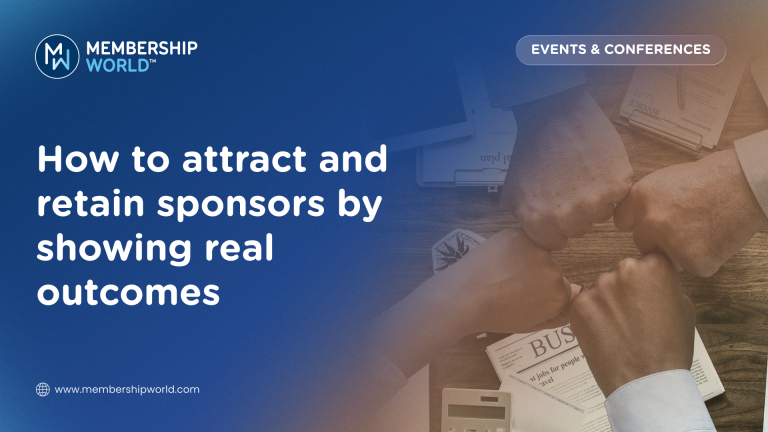
Events are the lifeblood of associations. They are where members come together, share ideas, and leave with new skills, new contacts, and renewed motivation. But in 2025, the calendar is crowded. From global mega-conferences to niche workshops and hybrid gatherings, associations face more choices than ever about where to invest their time, money, and people.
The challenge is clear: not every event deserves a place on your schedule. With budgets tightening and expectations rising, associations need a smarter way to decide which events are worth the investment.
This blog explores how to cut through the noise, evaluate events through a practical lens, and build a calendar that delivers maximum value for both your organisation and your members.
TLDR
- Associations have more event options than ever, but not every one creates real value.
- Use three lenses to decide: member value, organisational value, and operational value.
- Focus on events that align with strategy, deliver tangible outcomes, and stand out from the noise.
- In 2025, fewer but better chosen events will be the key to lasting impact.
Why this question matters in 2025
Events have always been central to association life. But the landscape has changed dramatically over the last few years:
- Budget pressures: Economic uncertainty means associations are expected to do more with less. Every trip, every stand, and every ticket needs to justify itself.
- Member expectations: Attendees no longer want to sit passively through presentations. They expect interactive formats, networking opportunities, and immediate takeaways.
- Hybrid fatigue: The rush into online events during the pandemic created both opportunities and burnout. Members now want a balance — meaningful in-person experiences supported by digital convenience.
- Sponsor scrutiny: Partners and funders increasingly demand clear ROI on sponsorship dollars. Simply showing up at a crowded exhibition hall isn’t enough.
Given these realities, the question for associations is not “How many events should we attend?” but “Which events are truly worth it?”
Three lenses for evaluating events
The smartest associations are now applying a more structured approach to evaluating events. Instead of chasing every opportunity, they’re asking how each event contributes to three core areas.
- Member value
Ultimately, events are about the members. If your members don’t benefit, the event isn’t worth it. Signs an event creates strong member value include:
- Opportunities for networking and community building.
- Content that directly advances careers or strengthens professional identity.
- Recognition and visibility for members through speaking, presenting, or volunteering.
- Inspiration that brings members back motivated to contribute more.
If you can’t draw a clear line between attending the event and improving the member experience, think twice.
- Organisational value
Associations themselves need events to advance strategic goals. This may mean:
- Raising the profile of your association within your sector.
- Building partnerships with other organisations.
- Attracting sponsors, funders, or partners.
- Gathering insights into new trends and innovations.
An event that ticks these boxes becomes part of your growth strategy — not just a line on the calendar.
- Operational value
Some events are less about members or branding, and more about your own internal learning. For example:
- Events where staff learn about the latest event technologies.
- Conferences focused on membership growth or retention strategies.
- Forums where you can benchmark against other organisations.
These may not always have visible outcomes for members, but they strengthen the team’s ability to deliver value in the long run.
Other factors to consider
Beyond these three lenses, here are additional practical questions associations should ask when weighing an event:
- Relevance: Does the event align with your mission and your members’ needs?
- Audience overlap: Will the people you most want to reach actually be there?
- Cost vs ROI: Is the return in terms of leads, learning, or exposure worth the spend?
- Uniqueness: Does the event offer something you can’t easily replicate elsewhere — whether in terms of speakers, audiences, or formats?
- Strategic fit: Will attending help you move forward on a key organisational priority this year?
Examples in practice
Consider a few scenarios associations face:
- The global mega-conference: Huge crowds, international presence, but expensive travel and time commitments. Unless you’re aiming for global visibility, this may deliver less value than a targeted regional gathering.
- The niche industry forum: Smaller scale, highly targeted, and often more cost-effective. For many associations, this delivers greater member and organisational value.
- The hybrid learning summit: Offers flexibility and access to top-tier content, but risks lower engagement. The decision here hinges on how well the format supports both learning and networking.
- The sustainability-focused event: For associations looking to align with ESG goals, these may be essential despite smaller audiences. The reputational and operational value can outweigh numbers.
A simple decision framework
Here’s a practical framework associations can use when evaluating any event in 2025:
- Does it create clear value for members?
- Does it advance organisational visibility or partnerships?
- Does it strengthen staff knowledge or operations?
If an event doesn’t meet at least two of these three tests, it may not be worth the investment.
The trend towards fewer, better events
A striking trend for 2025 is a shift away from doing it all, towards doing less — but better. Associations are realising that trying to attend every major event dilutes their impact, drains resources, and leaves staff stretched thin.
Instead, leading organisations are curating a focused calendar of high-value events. These are chosen strategically, invested in fully, and maximised for visibility and outcomes. The result: stronger ROI, better member experiences, and more resilient operations.
Final thought
Choosing which events really matter in 2025 isn’t just about logistics. It’s about strategy. Associations that get this right will free up resources, create more meaningful experiences for members, and strengthen their role in the wider sector.
So the next time an invitation hits your inbox, don’t ask “Can we attend?” Ask “Does this really matter?”



